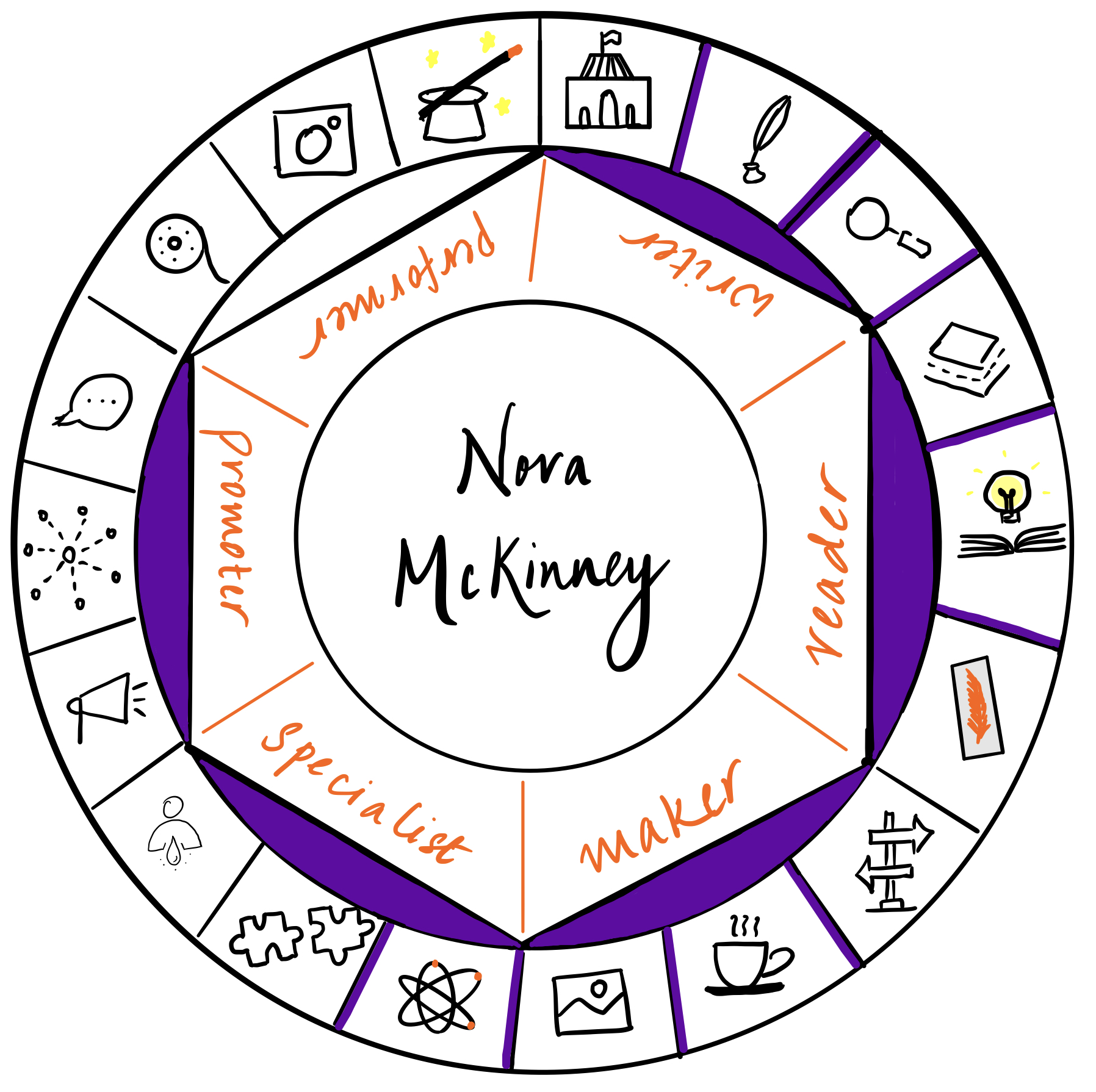
I met Nora McKinney through Matthew Samuels and once we started chatting, we realized there are so many issues in writing that we wanted to talk about. Inspired by George Styles’ post on academia, Nora is going to tell us about the parallels she has seen between the academic world (she has a PhD in astrophysics, is currently working as a climate scientist but is soon going to leave academia) and the writing and publishing world.
We have chatted a bit about academia and sciences in the past with George Styles. With Nora, we will draw some parallels with the publishing industry and what Nora has learned as writer in this community. Let’s get started.
On Being a Good Student
Nora, what is your PhD in and what interested you to get into graduate studies?
First of all, thank you for having me! I did my PhD in theoretical astrophysics. The question as to why I pursued studies in astrophysics has a complicated answer, and going the academic route has caused me some mental health problems which I only recently began to unpack.
See, when you’re good in school, you’re pushed (by society, your teachers, your parents, your own ingrained preconceptions) into certain career paths.
In high school, physics and maths fascinated me, but it was obvious since my early childhood that I was that child who always read and wrote. Still, when I couldn’t decide between studies in physics and philology, my physics teachers were horrified: “A mind like yours can’t study philology! You need to study physics!”

Of course, when you’re a good student, society (especially the conservative society I grew up in) wants you to be an engineer, a doctor, or a lawyer. But I was subversive and I decided to study physics, then do my graduate studies in astrophysics. It took me years, decades even, to realise that this wasn’t the right career for me. In those decades, I felt inadequate. I tried to make myself successful in academia only to fail miserably again and again. Why wasn’t I good enough? Why couldn’t I publish like others did? Why did I repeatedly fail at networking and creating collaborations? Wasn’t I smart enough? And if I wasn’t smart enough, then what was left in life for me? My brain was the only thing I had. These thoughts pushed me deeper and deeper into a vicious circle of impostor syndrome and inefficiency.
I know now the answer as to why my scientific career didn’t work out: science just isn’t my thing. It isn’t that I’m not smart enough to publish scientific papers–I am, and I have published, although I’m not prolific. What I lack is the drive that makes you a successful scientist. My math is good enough, my physics knowledge is good enough. But I don’t think about my research in the shower. I think about prepositions! Words truly are my life. As much as I love physics, I was never devoted to it, and I never will be.
It’s fun, but it doesn’t fulfil me, and it’s not the driving force in my life. And for twenty years I was afraid to admit it to myself because, hey, if you’re smart, you got to prove it to the world, right? You got to do smart things! It was a sick mentality and it didn’t work.
Your journey in physics reminds me a lot of mine in computing science. I got into computing after school because I was a very good student and the career that was going to give me control over my time – work from home – was the best thing to do. Coming from a family of professors it was no brainer that I was going to be one. But during my Masters, I realized I loved teaching more than my research itself. I did what I was told. I was excited to read books when I got home rather than find a more efficient way of writing my code. My supervisor did recognize that and wasn’t sure if I liked computing enough to make an academic career out of it. It was a tough time and I don’t regret not doing a PhD in computing even though I have a career in computing science, four years since completing my MSc and a MEd and B.Ed. later.
It’s good that you realized it so early on. You saved yourself a lot of trouble.
On Academia and What Matters

What kid of myths and glorified ideas about the academic world were shattered when you started to pursue grad work?
Science is an uncertain career path, and a very hard one. The nitty-gritty of it is tedious and you mostly work on tiny sub-problems of sub-problems in order to publish a paper few people will ever read and which more often than not makes no real difference. There are few–if any–“aha” moments, and it’s much less glamorous than what is depicted on TV.
The precariousness of your situation as a scientist on fixed-term contracts is always felt, and it’s nearly debilitating. The contracts are short, the competition is brutal, you have to move from country to country (do the post-doc dance, as I like to say), putting your relationships at risk. You’re overworked and underpaid, and you’re expected to do it all for the love of science. The silent assumption is that you’d still do it if you weren’t paid because science is the grandest of ideals! You’re one of the few select ones, so you’re not supposed to complain or even ask for basic work-life balance. You just have to do an incredible amount of work and be grateful for the opportunity. Bullying, sexism, harassment are rampant. You don’t have to believe me, just Google ‘harassment and bullying in academia.’ What you’ll find is a small fraction of what’s going on.
Even after you’ve completed some post-docs, it’s still very likely that you’ll end up trying to find a job in industry at an advanced age, competing against people ten or twenty years younger than you who are cheaper and not overqualified, and without having learned how to market your considerable skills to the industry world. This is a reality everyone knows and almost masochistically accepts. We all know that the ratio of PhD degrees to permanent jobs in academia is something like ten to one, if not worse, but we keep competing with our peers, breaking ourselves and ruining our mental health (mental health problems are prevalent in academia to a horrifying degree) instead of addressing the real issue: academia is sick and needs a total mentality overhaul.
One of the biggest things that has to change is the “publish or perish” culture. This results in less good science being done.

What’s the use of thousands of papers of questionable quality being published every year in any given academic field? Does anyone even read them or profit from them? Are we truly advancing science this way? I can tell you with some degree of certainty that we aren’t. These days, we’re told to get that paper out. “Number of papers” is all we brag about. What do numbers matter? Did we publish something that actually makes a difference? What about quality and impact? These things are mentioned fleetingly, but the number is what really counts.
It’s the same in the literary world. People strive to write and publish many books because they are told that this is the way to sell more and gain fame. But I don’t see the reason for publishing so much. For me, writing is art, and quality trumps quantity. One amazing piece of literary work is–to me–preferable to a million mediocre books.
I know what some people are going to say: “It’s possible to have both quantity and quality.” Of course, some authors can write books of higher quality in a shorter amount of time. But I guarantee you, the literary masterpieces need time to ferment and grow.
The book I want to read is the one whose writer has pondered every passage and massaged it to perfection. There’s something magical about reading such a book, a book whose every sentence is perfect, where phrases follow one another in a seamless dance of linguistic harmony.
I can’t speak from an author point of view, but I can speak a bit as a blogger, which is a different kind of writing. I write on my blog everyday. Most days it is book reviews or author interviews, but more recently, I have switched to posts like this one – Creator’s Roulette. Even though I am posting every day, you and I both know that this post was not shelled out in one evening. We started this conversation March 21st I think. 🙂
My favorite posts are exactly the ones that take time – where I talk to multiple people, get their opinion on it, research it. I am likely an outlier in the blogging world to produce such a variety of posts consistently. In that sense, quality and quantity are hard to compare because we all come in with our assumptions of what quality is. In blogging, posting everyday is quantity but quality is the amount of time put into each of those posts, and is not represented by the amount of time in between posts.
Exactly. The work you put in it shows. It’s immediately obvious that your blog is a product of love, care, and diligent work, and this is why I am much more likely to come back to it even if you don’t post as often. After all, we all have limited time and I’d rather spend it reading something of quality. For me, books are the same.
On The Writing Community
When did you become a part of the writing community?
In the summer of 2019 I finished editing my first novel, “A Natural.” This book was written almost accidentally, and I initially had no intention of marketing (or, indeed, publishing) it. I didn’t know anything about the (self-)publishing world, I had no idea what a literary agent was or how KDP worked. Still, I didn’t want this to stay in a drawer, so I just clicked on the first self-publishing company that turned up in my Google search and put the book out there. Then I made a Twitter account. I thought I’d find a few friends and show my book to them, and who knows, maybe a person or two would want to read it. Then I stumbled upon the Twitter Writing Community.
What a journey this has been! I found new friends, discovered some wonderful books, and of course I got some lessons in the harsh realities of publishing. Meeting like-minded people, especially since I still work in a scientific field where people tend to be less literary-minded, has opened up new possibilities and made it all worthwhile.
What are some lessons you have learned from your studies that have helped you navigate the writing and publishing world?
This is a big one and it took me nearly twenty years to learn: you have to define the meaning of the word “success” for yourself.
I have failed in three different career paths, two of which were academic. I am now unemployable in academia because I haven’t published many papers, and I have next to zero experience in industry, which, along with the fact that I’m a middle-aged mother of two, makes any young man of similar education a cheaper and better hire. By any traditional standard of success, I am not successful. But when I look at my supervisor, a scientist considered successful, with papers in the most prestigious journals, invitations for talks at conferences and meetings, whose research has even made it to the science sections of newspapers and magazines, I see an overworked and sleep-deprived person who struggles to maintain balance, who is constantly anxious and has health problems because of the stresses of work. Do I really want that? You might have guessed my answer.
You know my answer too. 🙂
But how about publishing? What is considered success in that field, and is it the same for everybody? Take book sales numbers, for example, something that many writers aspire to. I am troubled by how many books of little depth, literary value, or quality sell in the thousands and hundreds of thousands. So, I decided to not care about how many copies I sell. I am horrible at marketing, after all, and what is more, I absolutely despise it. It’s wonderful to be read, but I won’t lose sleep over sales numbers.
Still, if book sales are a measure of success for you, that’s awesome–go for it! Write the next best-seller, be successful, be happy. If having a productive career in one field of science or industry is your measure of success, that’s also great, do it! If having a happy family is a measure of success… You get my point. Everyone has to decide for themselves.
I have decided to eliminate the word “success” from my vocabulary. I’ll continue doing the things I feel like doing and trying to grow as a person and be happy. I struggled for years trying to fit in others’ definitions of success. I don’t want my life to be about their expectations. It has to be about my contentment.

Over the last couple years, I have been a part of a couple of different communities on twitter – the teaching community, during my teaching degree, and now the writing community since becoming a blogger. Just recounting my recent experience of opening up the invitation for Creator’s Roulette to anyone who wanted to join in, the response was mostly from authors and a couple people who I did reach out to wondered if it was ok that they were not published. In a community that is supposed to be supportive, I find that quite interesting because it implies that being not yet published makes us a little less. As a blogger, I have had to make myself believe that I am also a writer, these categories make us forget that bloggers also write, and it does not have to be a book! Do you think that fact that everything is a competition (even if it is unspoken) makes the community more superficial and self-centered? Academia is equally cut throat.
First of all, bloggers are writers. Content writers are writers. Everyone who writes a text for others to consume is by default a writer!
To tell you the truth, I didn’t think of writing as a competition, but I suppose you must see it this way if you strive for readers’ time (which, of course, translates to income for the writer). I do think that the community is self-centered and has little interest in promoting quality. This is why I resolved early on to promote really good indie books (which I found after a not inconsiderable amount of time searching and reading excerpts) instead of promoting myself. What good does another “Buy my book!” tweet do? And don’t get me started on the millions of daily retweets which are not true endorsements of the writers’ work. People think they’re helping by retweeting, but the dilution effect is overwhelming. The writer’s work gets lost in a sea of millions of retweets, and its visibility is reduced instead of increased. I support good writers by buying, reading, beta reading, advertising (I have an indie books recommendation page on my website) the good books.
On Numbers in Publishing – Sales, Followers, Likes and Retweets

Comparing this to teaching, and I hope you will add from your own experience here, the teaching community is all about the kids. Teachers post about the amazing things they have done in their classroom and other teachers adopt those things but the writing community discussions are usually limited to ‘How is your WIP going?’ and ‘See my book is on the bestseller list’ or ‘Share your link for readers!’ You can’t really take anything away from such things. I don’t see people sharing their writing struggles or how they research – I see people posting numbers – I wrote 10,000 words today. Competitions like NaNoWriMo encourage that. Is there a way we can be more supportive and help each other?
It’s the “publish or perish” paradigm all over again, isn’t it? Why on Earth would the number of words you wrote matter? I truly don’t understand it. I am happier if I write a hundred wonderful words a day than if I write a mediocre novel a month. Many will disagree with me, saying “just get the first draft out! You can’t fix what you haven’t written!” But you can’t fix a fundamentally bad draft either. And this leads back to the quality-over-quantity subject we discussed earlier.
The only way I know to be supportive and help is to give people my time and my expertise. I beta read, I sometimes edit for free (don’t tell anyone! Haha) I buy and review books. I will not coddle ears, though. The unconditional support of everyone towards everyone in the Writing Community is not helping. I am not the person who’ll cheer you on if you write a bad book, and I don’t think that “everyone can make it if they learn and try hard enough.” I also don’t buy the “your trash is another person’s gold” platitude. There should be some basic standard of quality, even if we’re talking about art.
I absolutely agree with that. I value relationships and those are not built by accepting review copies from authors. Those are built by having conversations, giving feedback, being genuine. I have recently started beta reading and it is so refreshing to just read a book without the expectation to review it (in this particular case, the author just wants a reader’s true experience). I regularly buy books that are indie as well as traditionally published authors. I recently started a Buy me Coffee page and all donations will go towards indie books only. Yes, I do tweet and write about the books I have read but that’s giving support from a reader’s perspective – it’s not a ‘buy my book’. It’s a ‘maybe check out this book, I liked it’. I often ask my writer and author friends to review my writing. It’s a cycle of getting better.
As with dancing, sports, music, science, and everything else, you need a certain combination of talent, perseverance, training, and last but not least, luck, to achieve what we’d conventionally call “success.” We cheer on a kid who wants to be a professional football player, but if the kid is really bad at football, we don’t say “keep it up! You WILL make it!” I also know it from ballet: there are only a few children with the right combination of flexibility, strength, talent, and drive who train hard and eventually stand a chance of being professional dancers. For the rest of the kids, we just try to be realistic and consider what other options there are. Can you continue it as a hobby? Would a different path be better and make you happier? So, my very controversial opinion is that not everyone who wants to be a writer should be a writer. Humanity doesn’t need hundreds of millions of books. We need good books, and the good books are lost in a sea of millions of publications. Thus, literary diamonds are lost forever.
Here’s my last question – A friend and I were talking about best seller lists and how every publisher has their own and so does Amazon but every single one of them is biased. A book that is not on Amazon will never be on that list. How can we find quality good reads? Publishers obviously vet things a lot more and that isn’t the case in self-publishing. Do you think it is this adherence to high quality that led to self-publishing becoming a thing?
I have no idea. I’m very new in this scene, but I have been told by people with decades-long experience in publishing that the “vetting” you’re talking about is not necessarily directed towards literary quality. Publishing houses have one goal: to sell. This means that they don’t take chances, and what’s published is mostly what’s similar to what has sold in the past. If you’re a literary genius doing a whole new thing, chances are, trad will not publish you. What if you’re genre-defying, rule-bending, style-defining?
The problem with self-publishing, though, is that too many people think they are that magical unicorn, the misunderstood genius, or at least they overestimate the value of their own work. It’s the well-known Dunning Kruger effect: statistically, the worse you are at a skill, the more you overestimate your ability (please, do not apply statistics to individuals, though!). And the unicorns–the true geniuses–actually underestimate their abilities. This results in a huge volume of sub-par books being self-published, mostly because people never got honest feedback. And, of course, most of us are afraid to give absolutely honest feedback to those we consider our friends! What this leads to is that, with the reviews by friends and family and those who withhold negative reviews for fear of retaliation or because they have difficulty giving negative feedback (something that’s absolutely understandable, and I have lots of difficulties with, too), most self-published books have high ratings. What’s the point of having a rating system, then?
I don’t really think there’s a solution to this problem–indeed, I’m sure many don’t perceive it as a problem, and they will certainly not like me for expressing these opinions. I don’t have a way of discovering the really good books, other than “read a lot of excerpts and listen to smart people’s recommendations.” Maybe the market will self-regulate, and maybe a way will be discovered for people to actually find the brilliant books (hint: look at books with lower ratings, not close to five-stars, but above three-point-five. Trust me. Those are the ones that people not connected to the writer have rated!).
But the future of publishing is indie. We just have to find a way to make it work.
My way is: be honest. Give honest, constructive feedback, if you can. And, yes, dare to give less-than-glowing reviews. Retaliation or being disliked by the community is a risk I’ll have to accept if I’m to promote this idea. If you come to me for my opinion, I won’t be mean, but I won’t coddle ears. Last but not least, I’ll stay true to my art and hope people will notice!
I hope you enjoyed this candid conversation about academia and publishing. There is always room for betterment and that only starts when we recognize what our goals are. I is easy to feel bad and think how other people are finding success but ultimately, we all have to work to define what it means to us. Armed with A Book is at the top of my mind most of the day because it is my baby and success for it cannot be reduced to a number. More on that later. 🙂
Want to connect with Nora? Find her on her website or on twitter.

Cover Photo by Joyce McCown on Unsplash
Image with graduation caps on Unsplash.
Image of a reading room in Net York on Unsplash.
Image of open books on Unsplash
Passion led us here phot on Unsplash.
Photo of graph and measurements on Unplash.

Be First to Comment